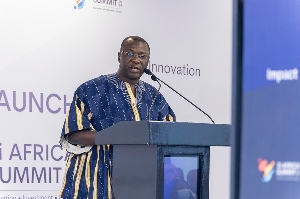The Minister of Finance, Dr. Mohammed Amin Adam, has reassured Parliament of his dedication to reviewing companies’ requests for tax exemptions.
“I want to assure them [Members of Parliament] that I will take a look at these exemptions. We will rationalise and review them and I’ll come back in two weeks to report to Parliament. And I hope that when I come, you will support me in whatever rationalisation we are going to do,” he said.
His remarks came in response to Minority MPs’ rejection of a proposed US$300million loan facility intended to finance the First Resilient Recovery Development Policy Financing. The MPs argued that funds of such magnitude could be generated domestically by eliminating tax exemptions for private companies.
The Minority stated that tax exemptions currently under consideration by the Finance Committee of Parliament amount to approximately US$449million, equivalent to GH¢5.5billion. They expressed concern about the substantial value of these exemptions, suggesting that they could potentially reach around GH¢12.5billion. This figure exceeds the targeted revenue of GH¢11billion from new taxes introduced in the 2024 Budget.
Led by Minority Leader Dr. Cassiel Ato Forson, the MPs stressed the importance of improving measures to boost domestic revenue. They criticised the numerous tax exemption applications currently being reviewed by Parliament, highlighting them as potential sources for increasing domestic revenue mobilisation efforts.
“Tax exemptions before the Finance Committee amount to US$449million. We do not need to borrow because if we manage the tax exemptions alone well, that US$450million that we are going to the World Bank to borrow – we can get it locally,” the Minority Leader noted, pointing to the US$300million loan being sought and an additional US$150million loan to finance the ongoing Greater Accra Resilient and Integrated Development (GARID) Project.
The proposed US$300million facility is a concessional financing agreement between the Government of Ghana – represented by the Ministry of Finance – and the International Development Association.
He additionally urged the government to retract the tax exemptions as a strategy to revive the struggling economy.
“In good conscience, our position is that if the government wants, they should come and withdraw these tax exemptions; then we will see that this government has taken positive steps to recover the economy that they ran aground.
Despite the opposition from the Minority in Parliament, the House approved the US$300million loan.
The loan facility, according to the government, aims to achieve several key objectives, including restoring macroeconomic stability and debt sustainability, fostering inclusive growth while safeguarding the interests of the poor and vulnerable. It also seeks to strengthen monetary and exchange rate policies to reduce inflation and bolster external reserves.
Additionally, the facility aims to restore fiscal sustainability, promote financial sector stability and private sector development, enhance financial discipline within the energy sector and improve social and climate resilience, among other goals.
The concessional financing agreement between the government and the International Development Association (IDA) of the World Bank Group includes a grant element of 26 percent, a repayment period spanning 25 years and a grace period of five years.
Presenting the report of the Finance Committee on the agreement, Kwaku Kwarteng, Chairman of the Committee, noted that the loan constitutes the first tranche of the World Bank’s US$900million Development Policy Operation (DPO) series for the financial year 2023-2025.
The committee report also stated that the US$300million facility is not allocated to any specific project in the 2024 Budget.
“Mr. Speaker, let me take this opportunity to clarify a few issues. First of all, this is not an IMF facility, it is a World Bank facility. It is a concessional facility for 25 years. The payment period has a grace period of five years interest of about 1.25 percent and it has a grand element of 26 percent,” the committee’s chair added.
Business News of Monday, 18 March 2024
Source: thebftonline.com

















